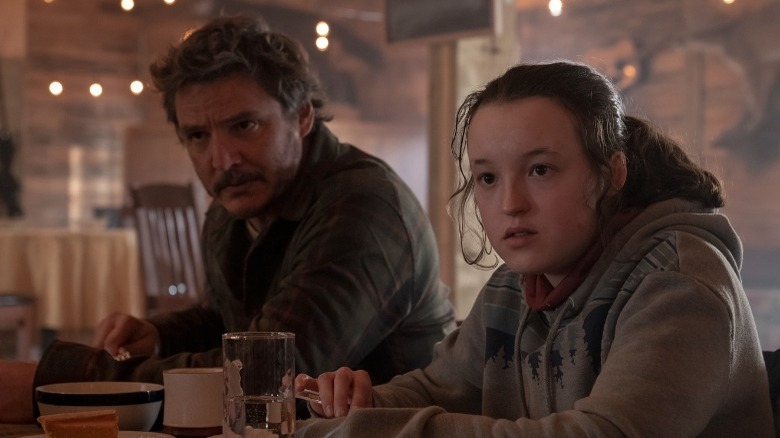The Last Of Us Was Never Going To Recapture That Perfect Game Ending
This post contains spoilers for the season 1 finale of HBO's "The Last Of Us."
The ending of "The Last Of Us" — specifically the video game, although the show makes great use of a similar ending — is what elevates it from a fantastic story to a downright masterpiece. For the first eight episodes of the HBO series and the majority of the Naughty Dog video game on which it's based, "The Last Of Us" seemed to be a story about imperfect, broken heroes bound together through circumstance. Joel (Pedro Pascal) and Ellie (Bella Ramsey) met as strangers, but grew into a family of two. Only, as the finale demonstrates with a twist that feels both inevitable and devastating, families can be blinded by love as well as bound by it. Maybe this story isn't about heroes, after all.
The last scene of "The Last Of Us" is beautifully complicated and uncomfortable. After discovering that Ellie would have to die to make the vaccine that the pair travelled across the country to help create, Joel unceremoniously kills the Fireflies who wanted to use her body and brain. He escapes with an unconscious Ellie. When she wakes up, she's confused, and Joel's story seems a little too neat. The last moments of both the show and game feature Ellie asking Joel to promise what he said is true — that there was never any hope for a vaccine. He swears, and the camera lingers on Ellie's face as she becomes resolute, perhaps making the decision to put aside her doubts and believe him. "Okay," Ellie says, and the credits roll.
An ending, not a cliffhanger
It's a scene that hit incredibly hard in the original game, and Ramsey and Pascal's version of the final exchange is just as likely to leave newcomers to the story breathless. Still, some hardcore fans will no doubt compare the two versions and – as is the way with adaptations – find the second one wanting. The first time I saw the end of Craig Mazin and Neil Druckmann's TV adaptation of "The Last Of Us," I admit I wasn't left gobsmacked like I expected to be. But there's a reason for that, and I think it has nothing to do with what the adaptation changed or what it kept the same. Rather, HBO's "The Last Of Us" will never quite be able to match the Naughty Dog game because with a second season already in the works, audiences will sit with it not as an ending, but as a cliffhanger.
2020's "The Last Of Us: Part II" reportedly went into development quickly after the first game launched, but wasn't officially announced until 2016. That means that for three years, players who came to the game approached Ellie and Joel's final conversation as if it might be the last we'd ever get to see from them. It was an ending that forced us to sit with the game's most bittersweet subtleties. Joel's actions at the Firefly hospital take away Ellie's agency. But Joel's actions at the Firefly hospital also save Ellie's life. He saves her life for himself, unable to bear the idea of grieving another daughter. But maybe he also saves her life because she deserves to grow up. He dooms everyone, and then lies to her about it. She believes him, but her belief is her choice. In short ... it's a lot!
Can our binge-obsessed culture sit with ambiguity?
Players who fought their way through a bloody post-apocalyptic world only to have the game end on this quiet, emotionally loaded note had to reconcile with all the contradictions of those final scenes. If HBO's take on the end of "The Last Of Us" doesn't floor us quite as much, it's probably because viewers can simply Google "when does The Last Of Us season 2 come out?" instead of wrestling with the uneasy ambiguity of a moment that forces us to re-frame everything we knew about this relationship. It's by no means meant as a cliffhanger, but by virtue of the sequel's existence and the nature of television, some viewers will surely take it as such.
This isn't to say that there's a right or wrong way to watch or play "The Last Of Us." Rather, gamers' sky-high expectations for the finale's payoff may have been thwarted before the show was ever made, due to the simple fact that its ambiguous ending isn't the final chapter anymore. It doesn't help that binge-watching culture has conditioned TV viewers to expect and demand more story at all times, to the detriment of the stunning moments unfolding right in front of them.
The story's medium switch has allowed "The Last Of Us" to expand in beautiful ways, but in the end, it also positions a profound, all-time-great ending within a format that's designed to leave viewers asking, "What's next?" Back in 2013, "The Last Of Us" asked us to sit with its ending in all its upsetting, ambiguous thorniness. In 2023, I hope we'll be able to overcome the collective urge to get ahead of ourselves, and instead sit still once more to consider the weight of a powerful ending that leaves no easy answers.


